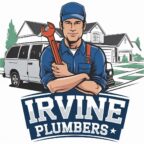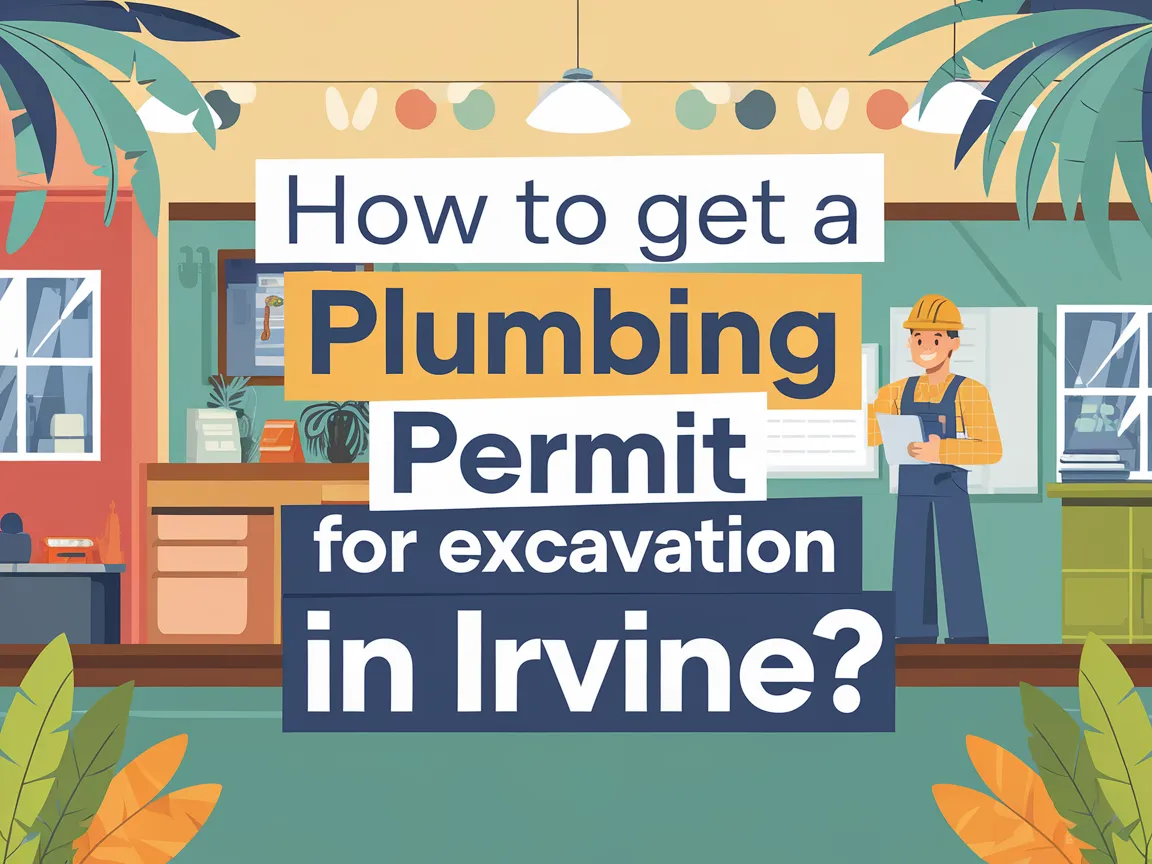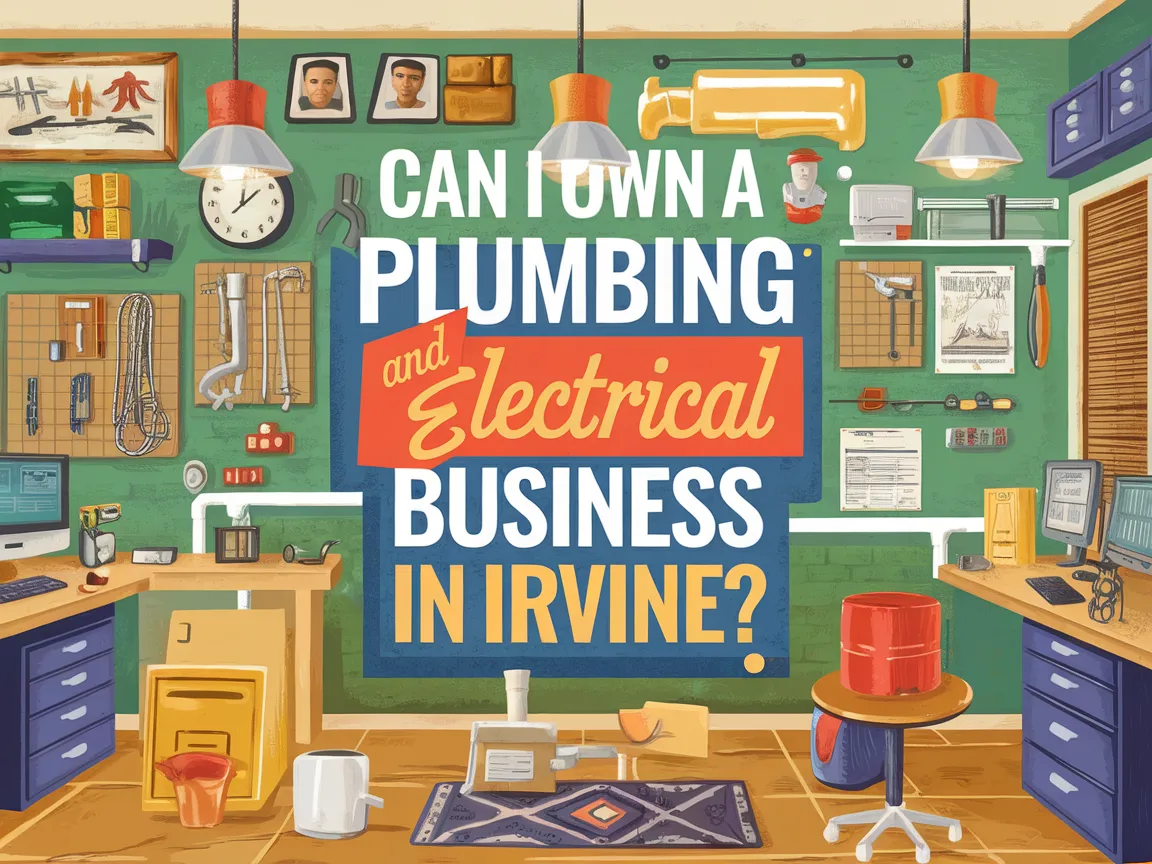Is Water Heater Plumbing or HVAC?
Last Updated: February 27, 2025
A water heater is a big metal box that warms up water for your shower and sinks. It’s like a magic machine that helps make your bath time nice and warm!
A plumbing head-scratcher I’m frequently asked about is water heater plumbing basics and whether it falls under HVAC. I’ve dealt with it many times, and I’m here to clear up the confusion and help you understand your options.
This article will cover what a water heater is, important things to consider before buying one, how to choose the right one for your home, the costs involved, factors that affect selection, special installation considerations, and when to call a pro for help.
Table of Contents
- Is Water Heater Plumbing or HVAC?
- What is a Water Heater?
- Before You Start Considering Water Heaters…
- How to Choose the Right Water Heater for Your Home
- Why Your Water Heater Matters
- How Costs for Water Heaters Are Determined
- What Factors Affect the Selection Of Water Heaters?
- Special Considerations When Installing a Water Heater
- When to Consult a Professional for Water Heater Installation
- FAQ
- Final Words on Water Heaters: Plumbing or HVAC?
- Additional Resources
Is Water Heater Plumbing or HVAC?
A water heater falls under the plumbing category, as it delivers hot water to your home. However, it also has ties to HVAC since it’s part of the heating process. So, in simple terms, it relates closely to both fields. If you’re experiencing issues with your water heater, you might want to check professional plumbing costs.
What is a Water Heater?
A water heater is a device that heats water for various applications like bathing, cooking, and even cleaning. These bad boys typically come in two types: tank and tankless. A tank water heater usually holds around 30 to 80 gallons (113 to 303 Liters) of water, providing hot water for your needs. The energy consumption averages about 4,500 to 5,500 watts (W), and they can be powered by gas or electricity, depending on your setup. It’s crucial since, in SoCal, you usually rely on it for everything, especially during chilly nights!
It was super helpful when I used it for my buddy’s remodel in Irvine, where we opted for a new electric water heater. This debate about whether water heaters are plumbing or HVAC is heated (Pun Intended). Generally speaking, it falls under plumbing more than HVAC due to the utility pipes they connect to and the installation knowledge required. When considering expenses, you’re looking at $1,000 to $3,500 (USD) for purchasing and installation, depending on size and model choices—totally worth it for those warm showers! If you encounter any unexpected complications during installation, you might need professional help with resolving plumbing system blockages.
Before You Start Considering Water Heaters…
What do you need to prepare before diving into the water heater process?
- Pipe Wrench: You’ll need a durable pipe wrench, like the RIDGID 31075 8-Inch. It’s essential for loosening and tightening fittings securely.
- Multimeter: A multimeter, such as the Extech EX330, is crucial for checking electrical connections and ensuring safe voltage readings.
- Plumber’s Tape: Grab some high-density plumber’s tape like Oatey 31275. It helps prevent leaks in pipe connections when you’re doing your plumbing work.
- Safety Goggles: Don’t forget sturdy safety goggles, like Bolle Safety Excel, to protect your eyes from debris during installation.
- Level: A reliable level, such as Stabila 29824, is necessary to make sure your water heater sits evenly, preventing potential future issues.
You should now have a good understanding of water heater options, benefits, and considerations. In the next part, we’ll discuss selecting the ideal water heater for your home.
Also See: When to Call an Emergency Plumber in Irvine?
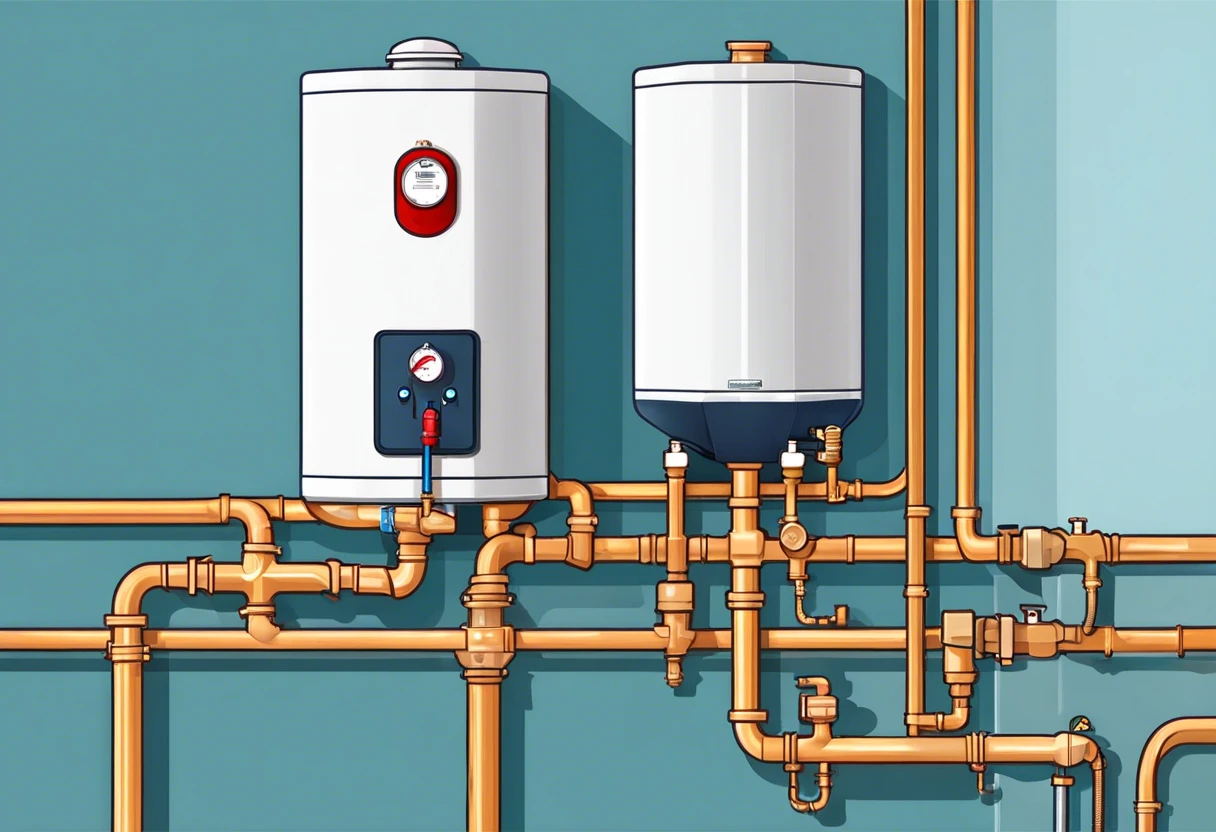
How to Choose the Right Water Heater for Your Home
Now, let’s cover the steps to determine if water heater duties fall under plumbing or HVAC—pay close attention!
-
Assess Your Hot Water Needs
Start by sizing up your hot water demand—how many showers, dishwashers, or washing machines do you use regularly? If you have a larger family or do laundry daily, you might need a tank-style heater that offers 30 to 80 gallons (113.5 To 302.8 Liters) rather than a tankless one, which provides hot water on demand but might limit flow rate during multiple uses.
Base your choice not just on gallons but also on recovery rates; for example, traditional water heaters recover better for large-scale uses. Knowing your usage patterns will help guide you toward the type of heater best suited for your everyday California heatwave needs.
-
Evaluate Fuel Type Options
Select the fuel type that fits your home; options typically include electric (With Heated Coils) or gas (Using Natural Gas Lines) water heaters. To maintain efficiency, especially in our lovely OC during fire season, you might want to explore if neighborhood norms favor quicker energy costs by opting for natural gas.
Consider ongoing energy costs; currently, electric heaters might seem cheaper upfront, but gas heaters can offer better long-term savings in the O.C. climate. Finding the right fit requires understanding which options align well with your resources and local utility prices.
-
Examine Installation Requirements
Before making a purchase, clear space and installation specifics should be next; your heat source must meet required codes in Irvine, with proper ventilation for gas systems. The door width can dictate maneuvering into tight spots—you’ll typically need a corridor of space around 24 inches (61 Cm) to work comfortably. If you’re considering expanding your professional services, you might want to explore owning a multi-trade business in Irvine.
A friendly local contractor can guide you on the specific requirements needed for your neighborhood, but don’t hesitate to check each water heater model’s manual. Remember, in California, you’ll likely require capped exhaust pipes for Energy Star-rated units to stay code compliant. If you’re unsure about proper installation techniques, professional plumbing methods can help.
-
Consider Energy Efficiency Ratings
Evaluate efficiency through MOD (Maximum Btus) calculations and check if you’re adhering to UEF (Uniform Energy Factor) protocols. Seek models rated at or above 0.9 for efficiency—with their environmental performance contributing to cleaner residential exhaust and lower energy bills over time.
Select options that meet energy standards to maximize your savings. Think about the trade-offs; catching less efficient models can end up costing you more in energy over the life of the unit.
Pro Tip: Never underestimate local utility incentives for energy-efficient systems; those rebates can knock some bucks off your installation costs—just ask around Irvine!
So far we covered selecting the best water heater for your home. Let’s look at why your water heater is important next.
Why Your Water Heater Matters
It’s critical to see why knowing your water heater type matters for plumbing and HVAC roles.
- Energy Efficiency: Choosing high-efficiency models can lower your utility bills significantly. Typically, tankless models save the most.
- Installation Needs: Some heaters, like heat pumps, need more extensive setups which can involve both plumbing and HVAC efforts.
- Local Climate Considerations: In areas like Irvine, tankless or heat pump systems could offer better performance, especially during peak summer heat.
We’ve wrapped up the significance of your water heater here. Let us turn our attention to how water heater costs are determined.
How Costs for Water Heaters Are Determined
When you’re buying a water heater, costs can vary a lot based on the type, brand, and installation specifics. You could be looking at anything from $500 to over $2,500 for a decent unit here in Irvine, CA. My advice? Budget around $1,200 to $1,500 on average to cover your basic needs, plus any unexpected expenses like permits if you’re on a tight timeline, especially when you need hot water ASAP for those summer BBQs! Over my years of servicing the area, I’ve seen basic installations take about 4-8 hours, while more complex setups, especially with existing pipe issues, can take longer and add extra costs. Homeowners should also consider the long-term durability of plumbing materials.
Cost Breakdown Table
| Item | Low Estimate ($) | High Estimate ($) |
|---|---|---|
| Water Heater Unit | 500 | 2,000 |
| Installation Costs | 300 | 600 |
| Permits & Regulations | 75 | 150 |
| Unexpected Expenses | 50 | 500 |
We’ve wrapped up how costs for water heaters are determined. Let us turn our attention to what influences water heater selection.
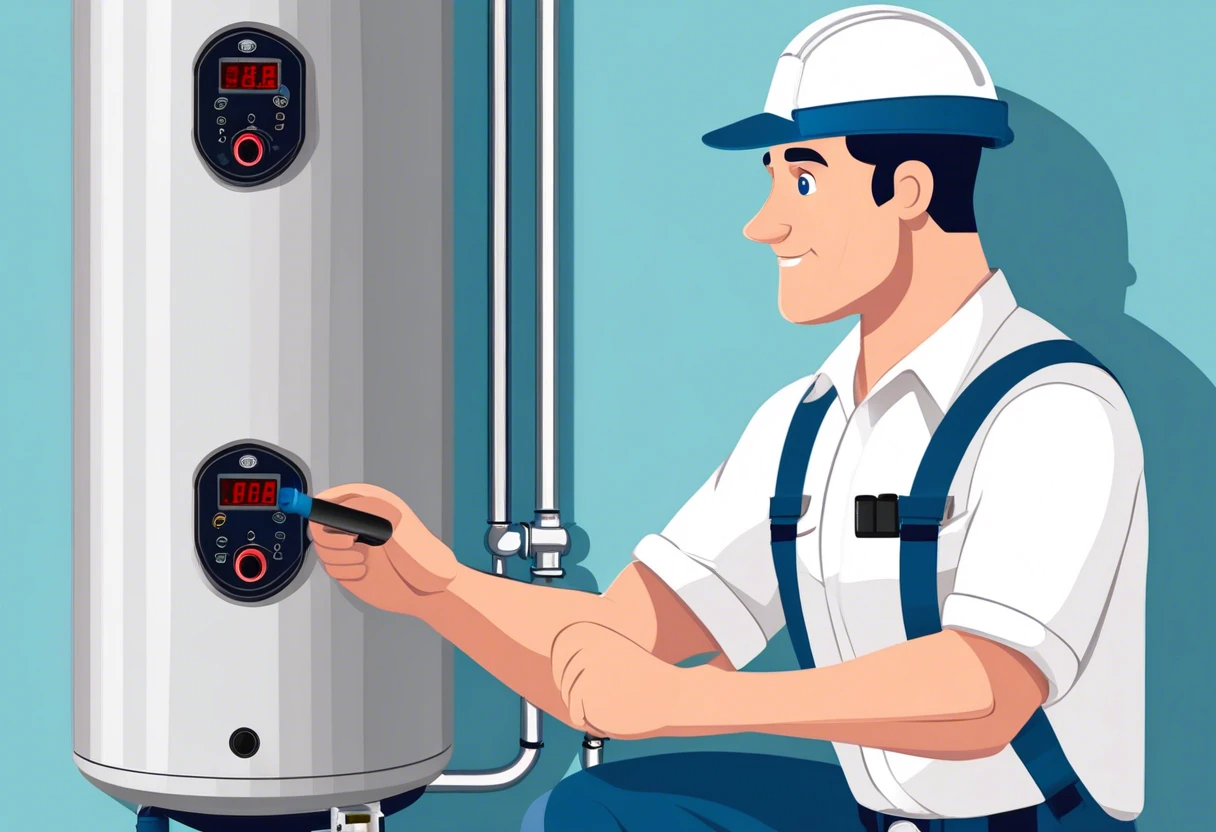
What Factors Affect the Selection Of Water Heaters?
So, what factors lead to choosing between plumbing and HVAC for water heaters? Great question!
-
Energy Source: Choosing between gas or electric affects efficiency and installation methods. Gas heaters can heat water faster but might need more venting.
-
Type of Heater: Selecting between tank vs. tankless can influence plumbing system adjustments. Tankless heaters may require additional plumbing work, but they save space and energy. When considering pipe materials for your water heater installation, you might want to explore the differences between galvanized versus cast iron pipes.
-
Local Codes: Building regulations in Irvine mandate specific installation requirements for water heaters. Make sure you’re up-to-date; nobody wants a surprise inspection! If you’re unsure about your plumbing responsibilities, check out landlord plumbing maintenance guidelines.
-
Space Availability: The installation space available can dictate whether plumbing edits or HVAC adjustments are needed. You don’t want to squeeze a big tank in a tiny closet! If you’re unsure about potential plumbing complications, you might want to protect yourself from unexpected charges.
Special Considerations When Installing a Water Heater
This section covers technical factors to think about when setting up your water heater.
- Tank Size: Ensure the tank has a capacity that meets your needs; it usually ranges from 20-80 gallons (76-303 Liters), depending on household size.
- Gas vs. Electric: Decide between gas and electric units. Electric units might cost $500-$1,500, while gas can range from $400-$1,200, including installation.
- Venting Requirements: Check local codes. Gas water heaters need venting (To the Outside) for safety and typically require 4-6 inches (10-15 Cm) of ducting.
- Location: Keep your unit in a space with a ceiling height of at least 6 feet (1.83 M) and sufficient airflow, especially for gas models.
- Pipe Insulation: In Irvine, we get heat most of the year, so consider wrapping hot water pipes to save energy and reduce losses, covering at least the first 6 feet (1.8 M).
When to Consult a Professional for Water Heater Installation
So, you’re wondering if you should tackle that water heater installation yourself. Honestly, it’s usually a good idea to call in the pros for anything involving plumbing like this. Look for an expert who knows their stuff—check reviews from fellow Irvine residents. One thing you wanna watch out for? Make sure they’re licensed and insured. I had a situation where a buddy tried DIYing and ended up with extensive water damage. You don’t wanna learn that lesson the hard way! If you’re unsure about your rental responsibilities, rental plumbing responsibilities matter.
FAQ
Is It Possible to Install a Water Heater Myself?
Yes, it’s possible to install a water heater yourself. But consider your comfort level with plumbing work and the necessary tools, like wrenches and pipe fittings. Mistakes could cost you a couple hundred bucks to fix, while a pro charges around $1,000 for a full installation.
What Are the Signs That My Water Heater Needs Replacement?
Many signs indicate your water heater might need replacing. Common red flags include leaking, inconsistent temperatures, and strange noises. Typically, after about 10 years, age also plays a role. If you notice significant wear or rust, expect replacement costs to be over $800 here in Irvine. When preparing for potential water heater issues, homeowners should know how to protect their plumbing system effectively.
Can a Plumbing Issue Affect My Water Heater?
Absolutely! Plumbing issues can negatively impact your water heater. Clogs or back pressure can lead to uneven heating and corrosive damage over time. You really don’t want water pooling around your unit since replacing a severely corroded heater can range from $800 to $1,500. Professional plumbers can help you navigate these complex maintenance challenges and secure reliable plumbing service contracts that protect your home’s critical infrastructure.
Is Regular Maintenance Necessary for Water Heaters?
For sure! Regular maintenance is key for water heaters. Flushing the unit twice a year minimizes sediment buildup and extends its lifespan, which can save you over $300 by preventing premature replacements. So, consider putting this on your calendar!
Are There Different Types Of Water Heaters?
You bet there are! There are various types of water heaters: tank, tankless, and hybrid models, each with unique pros and cons depending on your space and hot water needs. For instance, tankless water heaters often have a lower operating cost—around $0.25 per unit of energy—compared to standard models, making it easier on the wallet in the long run.
What Factors Influence Water Heater Longevity?
Several factors influence a water heater’s lifespan. The quality of installation and our area’s water quality can impact how long it lasts—the hard water here in the OC can be tough on internal components. A quality unit with proper maintenance usually lasts about 10-15 years with minimal hassle.
How Do I Know if My Water Heater is Energy-efficient?
Great question! Energy-efficient water heaters typically have a high Energy Factor rating. Models with higher ratings consume less energy—leading to lower utility costs. Look for units above 0.92 CF; they’ve likely received awards and can qualify for state rebates!
Are Professional Inspections Worth It?
Definitely! Professional inspections are totally worth it. A licensed plumber can spot minor issues for about $75-$150 before they turn into major headaches. This can lead to healthier water distribution in your home, fewer worries, and potentially better property value right here in Irvine. When you need expert guidance on addressing plumbing concerns, professional plumbers can help you.
Final Words on Water Heaters: Plumbing or HVAC?
That brings us to the end of our exploration into whether the water heater falls under plumbing or HVAC. We covered what a water heater is, how to choose the right one for your home, factors that influence selection, special installation considerations, costs involved, and when to seek professional help.
I hope these insights, gathered from countless jobs here in Irvine plumbing services, prove valuable for your home maintenance. Ultimately, understanding whether a water heater is plumbing or HVAC requires recognizing its critical role in both systems.
To delve deeper into this topic, feel free to visit Irvine Plumbers for a comprehensive range of resources.
Additional Resources
- Orange County Plumbing Association (OCPA) – https://www.ocplumbing.org
- Water heater install question.
- Who Should I Call for Water Heater Repair! | H & H
- Does HVAC Include Water Heaters? | Lions Heating & Air Conditioning
